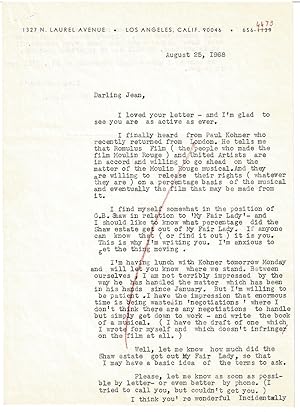wonderful correspondence pierre mure author von mure pierre woolf john dalrymple (1 Ergebnisse)
Suchfilter
Produktart
- Alle Product Types
- Bücher (1)
- Magazine & Zeitschriften (Keine weiteren Ergebnisse entsprechen dieser Verfeinerung)
- Comics (Keine weiteren Ergebnisse entsprechen dieser Verfeinerung)
- Noten (Keine weiteren Ergebnisse entsprechen dieser Verfeinerung)
- Kunst, Grafik & Poster (Keine weiteren Ergebnisse entsprechen dieser Verfeinerung)
- Fotografien (Keine weiteren Ergebnisse entsprechen dieser Verfeinerung)
- Karten (Keine weiteren Ergebnisse entsprechen dieser Verfeinerung)
- Manuskripte & Papierantiquitäten (Keine weiteren Ergebnisse entsprechen dieser Verfeinerung)
Zustand Mehr dazu
- Neu (Keine weiteren Ergebnisse entsprechen dieser Verfeinerung)
- Wie Neu, Sehr Gut oder Gut Bis Sehr Gut (Keine weiteren Ergebnisse entsprechen dieser Verfeinerung)
- Gut oder Befriedigend (1)
- Ausreichend oder Schlecht (Keine weiteren Ergebnisse entsprechen dieser Verfeinerung)
- Wie beschrieben (Keine weiteren Ergebnisse entsprechen dieser Verfeinerung)
Einband
- alle Einbände
- Hardcover (Keine weiteren Ergebnisse entsprechen dieser Verfeinerung)
- Softcover (Keine weiteren Ergebnisse entsprechen dieser Verfeinerung)
Weitere Eigenschaften
- Erstausgabe (Keine weiteren Ergebnisse entsprechen dieser Verfeinerung)
- Signiert (1)
- Schutzumschlag (Keine weiteren Ergebnisse entsprechen dieser Verfeinerung)
- Angebotsfoto (1)
Sprache (1)
Preis
- Beliebiger Preis
- Weniger als EUR 20 (Keine weiteren Ergebnisse entsprechen dieser Verfeinerung)
- EUR 20 bis EUR 45 (Keine weiteren Ergebnisse entsprechen dieser Verfeinerung)
- Mehr als EUR 45
Gratisversand
- Kostenloser Versand nach USA (Keine weiteren Ergebnisse entsprechen dieser Verfeinerung)
Land des Verkäufers
Verkäuferbewertung
-
A WONDERFUL CORRESPONDENCE between PIERRE LA MURE, the author of "MOULIN ROUGE", and producer JEAN DALRYMPLE, consisting of 10 LETTERS, including 2 by JOHN WOOLF, the British Film producer of "Oliver", "The African Queen", and the earlier film production of "Moulin Rouge".
Verlag: Los Angeles, California, 1968 & 1969. 1968 & 1969., 1968
Anbieter: Blue Mountain Books & Manuscripts, Ltd., Cadyville, NY, USA
Signiert
Zustand: Very good. - A wonderful, and increasingly caustic, correspondence between the author Pierre La Mure and producer Jean Dalrymple regarding production of a theatrical production of a musical based on his novel "Moulin Rouge" about the life of the French artist Henri de Toulouse-Lautrec. The correspondence consists of 4 typed letters signed by Pierre La Mure with retained copies of 3 of Jean Dalrymple's letters to La Mure, together with 2 typed letters signed by the British film producer of the 1952 movie of "Moulin Rouge" John Woolf, together with a retained copy of another of his letters to Jean Dalrymple and the retained copy of a letter from Jean Dalrymple to Woolf. La Mure has penned occasional corrections in red ink within the text of his letters and Jean Dalrymple subsequently drew a diagonal red line through La Mure's and Woolf's letters indicating she'd read and dealt with them. All the letters are in very good to fine condition. A wonderful correspondence which provides insight into the thoughts of those involved in attempting to stage a theatrical production of the musical. The novel was the basis for a major film produced by John Woolf and directed by John Huston in 1952. It is interesting to note that La Mure belittles Jose Ferrer, a close friend of Jean Dalrymple, for his performance in "The Man of La Mancha" as Ferrer starred as Toulouse Lautrec in the film. Following is a chronological description of the correspondence:1) August 25, 1968. An approximately 300 word 1 - 1/4 page typed letter to Jean Dalrymple on personal letterhead signed "Pierre". Pierre la Mure writes to producer Jean Dalrymple that Romulus Films and United Artists are willing to release their rights for a percentage and allow a musical to be made based on Moulin Rouge. La Mure finds himself "in the position of G.B. Shaw in relation to 'My Fair Lady' - and I should like to know what percentage did the Shaw estate get out of My Fair Lady." He complains that time is being wasted on unnecessary negotiations. He says that it is simply a matter of writing "the book of a musical. (I have the draft of one which I wrote for myself and which doesn't infringe on the film at all.)".2) August 28, 1968. A one-page retained carbon copy of a letter from Jean Dalrymple to Pierre La Mure. Dalrymple writes that Herman Levin will let La Mure know the percentage paid to the Shaw estate for Pygmalion. She emphasizes that she could have done a much better job herself than Paul Kohner has done on the musical negotiations.3) February 20, 1969. An approximately 300 word typed letter to Jean Dalrymple on personal letterhead signed "P". La Mure writes that he agrees with Dalrymple that Richard Rodgers "would give much prestige to the production." But he adds that "Lowe (of My Fair Lady).would even be better, I think". He tells her to forget about the French composer George Auric. "He probably looks down on him [Rodgers].And I don't think his music is very good anyway." (Auric was the composer of the music for the 1952 John Huston film of Moulin Rouge.) La Mure then makes an impassioned plea for the actor Charles Aznavour: "But I plead with you to consider Aznavour. Every fiber in my body tells it would be a bull's eye.He was born to be Lautrec." Along the left margin of the letter La Mure writes a footnote: "Let me know what Wasserman says?". Evidently Dale Wasserman was being considered for writing the book for the Moulin Rouge musical. Wasserman is best known for having written the book for "The Man of La Mancha".4) February 26, 1969. A two-page retained carbon copy of a letter from Jean Dalrymple to Pierre La Mure. Dalrymple writes that her "session" with Dale Wasserman was disappointing. Wasserman felt that Moulin Rouge is "too close in feeling, atmosphere and locale" to Montmartre, the musical he is currently working on. She says she will approach Neil Simon who "turned SWEET CHARITY from a disaster - when it opened out of town - into a hit." She also suggests Frank Loesser: "I.


